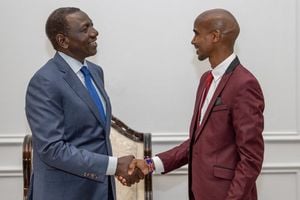Sudden twist as graft team seeks ‘chicken’ dossier

Ethics and Anti-Corruption Commission (EACC) Chairman Philip Kinisu speaks shortly after being sworn into office at the Supreme Court, Nairobi, on January 18, 2016. The commission said the Attorney General’s office had not forwarded to them any material from the UK. PHOTO | SALATON NJAU | NATION MEDIA GROUP
What you need to know:
- The bribery scandal has seen culprits sent to jail in the European nation but their alleged accomplices in Kenya remain free.
- The current stalling of investigations is a big blow to a directive by President Uhuru Kenyatta that all agencies involved in fighting corruption should work closely.
- The British government initiated and completed the process of investigating, charging and convicting those involved in the scandal.
Investigations into the Chickengate scandal that engulfed top officials of the national electoral body have taken a new twist after the Ethics and Anti-Corruption Commission stated categorically that they had not received any document from the British Government.
The commission said the Attorney General’s office had not forwarded to them any material from the UK.
The bribery scandal has seen culprits sent to jail in the European nation but their alleged accomplices in Kenya remain free.
When a government agency wishes to seek assistance from a foreign government, the AG’s office is the port of call.
In turn, it communicates with the relevant office in the foreign country.
In this case, the AG’s office would have communicated with British authorities, received the relevant documents and forwarded them to EACC.
Officials at the AG’s office recently told the Sunday Nation that they had received crucial materials from the United Kingdom government and forwarded them to EACC, introducing a mysterious twist to the saga.
WORK TOGETHER
An EACC spokesman told the Sunday Nation: “The commission has not received any documentation from UK as you allege. Kindly corroborate this with the AG, or other sources.” The AG’s office did not respond immediately to the subsequent inquiry.
This brings to sharp focus the government’s commitment to fight corruption despite public assurances that the war is on course.
The current stalling of investigations is a big blow to a directive by President Uhuru Kenyatta that all agencies involved in fighting corruption should work closely.
The agencies are: State Law Office, Ethics and Anti-Corruption Commission (EACC), Office of the Director of Public Prosecution (ODPP), Directorate of Criminal Investigation (DCI), National Intelligence Service (NIS), Financial Reporting Centre (FRC), Assets Recovery Agency (ARA) and Kenya Revenue Authority (KRA).
Following the EACC statement, questions are being raised on whether Kenya, despite helping British authorities on Chickengate, is willing to be helped.
There has been a back-and-forth tussle between the agencies on how the investigations should be done.
Ordinarily, EACC should initiate the investigations and ask the AG’s office to facilitate foreign assistance.
After investigations, the file is forwarded to the Director of Public Prosecutions. The DPP has already indicated that he has not received the Chickengate file from EACC.
The British government initiated and completed the process of investigating, charging and convicting those involved in the scandal.
British authorities commenced investigations on Chickengate in 2010.
BRIBED OFFICIALS
Chickengate involved a British printing company, Smith and Ouzman Ltd, which allegedly made illegal payments mostly to government officials in return for award of contracts.
The payments were called “chicken”, according to exchanges between officials of the company and their link-man in Kenya.
It emerged that Kenya co-operated closely with British authorities and a statement from the Serious Fraud Office of London thanked Kenyan authorities for their help.
“The SFO is grateful for the assistance provided by authorities in Kenya,” read a statement after conclusion of the case in a London court in February 2015.
During investigations, SFO detectives retrieved damning e-mail exchanges between S&O and Kenyan electoral and examination officials, shipping invoices and local purchase orders (LPOs) used by the procuring entities, to put together a solid case of corruption.
The British company also bribed officials in other countries like Ghana and Mauritania.
In Kenya, the case was against officials of the defunct Interim Independent Electoral Commission (IIEC) and the Kenya National Examinations Council (Knec).
At IIEC, those named in the scandal included former Energy CS Davis Chirchir, who worked as a senior manager at IIEC.





